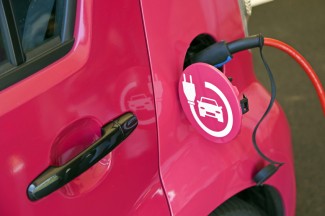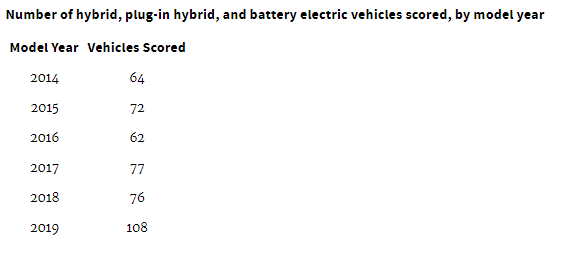In updated rankings published today, Greenercars.org has a new winner for 2019 — the Mercedes-Benz smart EQ fortwo Coupe. It now tops the Greenest List, beating the Hyundai Ioniq Electric by one point and joining other green vehicles with state-of-the-art technology such as automation and electric powertrains.
In addition to the smart fortwo, two other cars joined the updated Greenest List: the plug-in hybrid Prius Prime, ranking third, and its hybrid sibling the Prius Eco, ranking sixth. We released initial scores in January, but due to the federal government shutdown at the time, we were unable to score many 2019 vehicle models because they had yet to clear the Environmental Protection Agency’s certification process.
Today, we release the scores for an additional 74 vehicles, bringing the total number of 2019 models scored to 1,331. Each vehicle receives a green score based on an environmental damage index (EDX), which reflects the cost to human health from air pollution associated with vehicle manufacturing, production and distribution of fuel or electricity, and vehicle tailpipes.
Our Greenercars.org update includes many notable models with some form of electric powertrain, including an additional 14 battery electric vehicles, five plug-in hybrids, and five traditional hybrids. Compared to the past five model years, this is an increase of more than 40% in the number of electrified vehicle models scored, an all-time high and accounting for over 8% of models available on the market today.
In our database, you can find a list of vehicles eligible for parking benefits at LEED-certified buildings and our regional electric vehicle calculator that allows you to see how a particular EV would score if charged with your local mix of power generation plants.
Even with the large number of electrified vehicles featured here, our 2019 Market Trends report shows that the industry continues to push the envelope with advanced fuel-saving technologies such as downsized turbocharged engines. Clearly, automakers have made strides in efficiency, performance, and practicality, giving consumers cleaner options at all price points.
Many of the vehicles on the Greenest List also come standard with automated technology such as adaptive cruise control that, if implemented correctly, could save fuel and reduce emissions. However whether automation technology in general will successfully reduce fuel and emissions remains to be seen.
Greenercars will continue to evaluate how groundbreaking technology affects a vehicle’s lifecycle emissions. In the meantime, ACEEE is hosting a one-day Forum on Connected and Automated Vehicles: Energy Impacts May 6 in Washington, DC, that will feature more than a dozen speakers and four interactive sessions to discuss this very question. We invite you to participate by registering here.
We encourage consumers in the market for a new vehicle to consider buying green, because no matter the type of vehicle you desire, there is a model with a lower environmental impact.
For more information and the full list of the Greenest and Meanest vehicles, visit Greenercars.org




